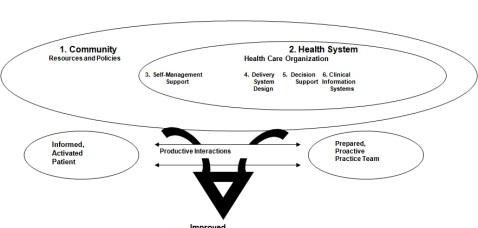In observance of National Wear Red Day, Americans will wear red to show their support for women’s heart health. Poor heart health can lead to congestive heart failure, one of the leading chronic illnesses estimated to represent 75 percent of the $2 trillion in U.S. annual health care spending. Also noted in the Institute of Medicine Report, Living Well with Chronic Illness, “chronic illnesses are slow in progression and long in duration, and they require medical treatment. All chronic illnesses have the potential to limit the functional status, productivity, and quality of life of people who live with them.”
In order to improve individual quality of life for chronic illness sufferers while simultaneously reducing healthcare spending, radical re-engineering of the healthcare delivery system must occur. One such innovative design can be found in British Columbia’s Expanded Chronic Care Model. According to this model, healthcare organizations must support chronic disease management (CDM) strategy at all levels. Attempts at improvement must be aimed at global change and include a defined process for addressing quality issues. Furthermore, agreements to facilitate care coordination must extend within/across organizations in the continuum of care and incent providers to improve quality of care.
The model further stipulates that health care service delivery should be tailored to assist practitioners in implementing planned interactions to support evidence-based care. Providing culturally sensitive clinical case management services for patients with complex health issues in combination with regular follow-up moves the needle in the right direction. In order to carry out these tasks, healthcare organizations should harness the potential of their clinical information systems through the use of business intelligence software to identify and target sub-populations that would merit additional focus for care planning, targeted messaging and intervention.
The patient’s role is also crucial to maintaining good health and this model demands that individuals play a central role in managing his or her health. Self-management support strategies include assessment, goal-setting, action planning, problem-solving and follow-up and establishing contact with community resources that provide support. Mobilization of community resources to support or expand healthcare for chronically ill patients remains additionally critical. The key focus here is to encourage: (a) patient participation in community programs (exercise, seniors and self-help groups) and, (b) partnerships with community organizations to support and develop interventions to bridge gaps in needed services.
Current healthcare delivery systems developed around acute visits and crisis management have not been successful in meeting chronic disease care needs. Based on brief and infrequent patient-provider interactions, these models do not provide the sustained support needed to maintain the healthy lifestyle changes critical to prevention and management of chronic diseases. To better meet the needs of these individuals, care systems must explore new ways to define collaborative care for living well with chronic disease.
Principle Healthcare Associates is an expert resource and dedicated advocate for Nurse Practitioner, Physician Assistant, Physician and Healthcare Executive job seekers. With many years of recruiting experience, we deliver strategies to help clients identify diamonds in the rough and candidates stand head and shoulders above the competition.
* Graphic: Wagner, E.H. Chronic Disease Management: What Will It Take to Improve Care for Chronic Illness? Effective Clinical Practice 1998; 1:2-4. Permission to reproduce model image granted from American College of Physicians (ACP), July 7, 2006.








